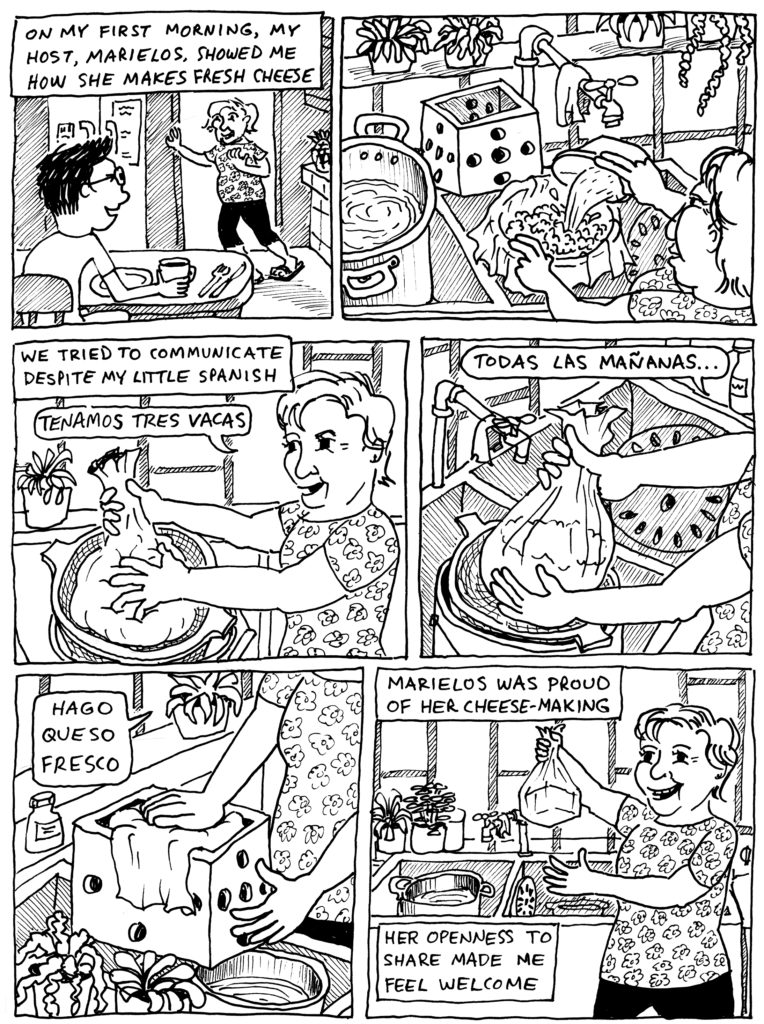Martha Newbigging has enjoyed a career in illustration as an independent artist for quite some time. As both a part-time teacher with Seneca College’s Illustration program and as someone who has taught in rural Nicaragua as part of their practicum in the past, they are likewise no stranger to teaching their craft to and learning from their diverse students in turn.
So, as a mature PhD student who further wanted to connect with new local communities and offer back their Arts experience, naturally the Narratives in/of Costa Rica: Individuals, Communities and their Voices course caught their eye. Taught by Professor Alejandro Zamora and offered at the Las Nubes York University campus in Costa Rica, the course offered an immersive focus through narrative work into Costa Rica and its local communities.
“We held classes at York’s campus in Costa Rica, which was in the mountains in a rainforest,” says Newbigging. “There were 16 students, and we stayed with local families in home-stay for the 10 days. The course was all about storytelling, related to ideas about Costa Rica and community there.”
Following an open-ended and flexible format, the course encouraged students to learn from the local and Indigenous communities via travel logs and interviews. Students kept ongoing journals and received prompts to further immerse themselves in their new environments and cultures. The final assignment was a travel log documenting their experience.
“While we were there, we were pretty much busy all day and into the evening,” Newbigging recounts. “It was a pretty intense experience, and days started at 8:00 a.m. It gets light there early, so people tend to get up in their homes at 4:30—5:00 a.m. The family I stayed with was on a farm, and have dairy cattle... so, they’re up early.”
For Newbigging, it would be the home-stay situation and environment itself—the “container,” as they would term in their work—that would prove the most fascinating subject for their own final assignment. They said they particularly appreciated how the professor was open to different media formats, too—ranging from video form, to written stories, to documentary-style interviewing and photo essays. In Newbigging’s case, it would be a 16-page comic book about their time as a home-stay with this local more-traditional, Catholic family living in rural Costa Rica.

The family was primarily made up of a straight married couple and their granddaughter, but the farm doors would be open to the lush and vibrant rainforest all day, with grandsons, daughters and farm work friends coming and going—a scene ripe with inspiration for an artist focusing on queerness and travelling abroad. Prior to beginning the course, Newbigging had already been drawing comics and thinking about autobiography and childhood memory—particularly the childhood experiences of queerness and trauma.
“So, the course, for me, let me get out of my head for a while,” Newbigging says. “To think about other people’s stories, other people’s lives, but in a way that circles back to my work. The story I made out of being there was about a traditional family context—living there, but coming out in that situation. It relates back to my dissertation work around queerness and childhood and disclosure, so it was a nice opportunity to zone in on a particular experience to show, and to figure out how to write about it. It brought the tension into sharp focus.”
For Newbigging, it would be a project that was both immensely positive, yet challenging. As their own story was one of authenticity in the face of perceived difference, they reflected in particular about their audience, and with whom to share their work. As part of their work, they sketched and drew in the home, including pictures of one of the hosts, the wife and mother of the household, working in her kitchen.
“She was really kind and generous and interested in what I was doing, and so I wanted to share drawings with her,” Newbigging said. “The question became: Do I share the whole book with her? This whole story? Which is a kind of another level of coming out about how I felt. It’s another form of intercultural exchange.”
They recall a special moment early in their trip in which their host showed them how she made cheese. “I could see she was really proud of this, and that she was actually sharing. She was being her authentic self. So that space made me feel more welcome to take a chance on sharing more about myself.”
Newbigging believes their story can be relevant to a Toronto audience as well, who reside in a city that already knows much about diversity of cultural backgrounds, and about diversity specifically in values and ideas around queerness. For Newbigging, the story explores the context one is in and how one perceives said space to be safe.
Beyond their final assignment, Newbigging also had the opportunity to lead a comics workshop for non-artists in the local community center library. The workshop was attended by all of their peer students from York, as well as community members.
“I’m really glad that happened. It was very well received,” Newbiggings says. "I got to see what the local people who attended were drawing, and I would be really interested in going back through the same program in a subsequent year to do more of that—perhaps a week-long workshop with the local community members to get them making comics and distributing some kind of comic books of their own creation."
“Thats’s something I would like to see if we can follow up on and continue.”
Article by Dennis Bayazitov special contributing writer
